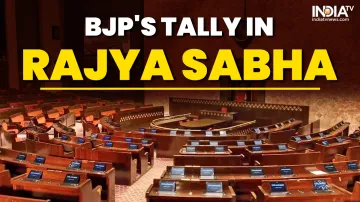BJP falls below 90 MPs in Rajya Sabha: What does it mean for party and how do numbers add up?
The BJP's numbers fell below the 90 seats mark and even farther from majority and the party will be looking to rebound in the upcoming elections to the vacant seats. The ECI is yet to announce the date for elections to fill the 11 seats vacated by the resignation of Rajya Sabha MPs.

The strength of the ruling Bharatiya Janata Party (BJP) dipped under 90 seats mark, going farther from majority in Rajya Sabha after four nominated members – Rakesh Sinha, Mahesh Jethmalani, Sonal Mansingh and Ram Shakal – who were chosen by the President, completed their respective terms on Saturday. The latest numbers of the saffron party in the Upper House of the Parliament has thus come down to 86 while the NDA’s figures now stand at 101. The current majority mark is 113 in the 245-member House. However, the alliance in power does enjoy support of seven remaining nominated MPs and an independent. Rajya Sabha’s current strength is 225.
Opposition’s numbers in Rajya Sabha
The Opposition’s INDIA bloc has 87 MPs, out of which 26 belong to Congress, 13 to West Bengal’s TMC, 10 each to Aam Aadmi Party and DMK. The remaining seats are held by those who do not align either with the ruling NDA or Opposition INDIA – KCR’s BRS and Naveen Patnaik's BJD.
What do reduced numbers mean for the BJP?
The NDA has the required numbers to pass Bills in Lok Sabha, however, that’s not the case in Rajya Sabha. The reduced numbers mean that the government will have to rely on non coalition parties to pass Bills in the Upper House. The parties on which the NDA will depend for passage of crucial legislations include its former ally AIADMK of Tamil Nadu, former Andhra Pradesh CM Jagan Mohan Reddy’s YSRCP, and others like the nominated MPs. This situation will continue till the BJP can fill up the vacant four nominated seats and the election for the 11 vacant seats, which is due this year, is held. The BJP-led NDA coalition is confident of winning two seats each in Maharashtra, Bihar and Assam. It is also eyeing to clinch a seat each in Haryana, Madhya Pradesh, Tripura and Rajasthan as they have the dominating numbers against the opposition.
How do the current numbers add up?
In the current scenario, the BJP needs NDA allies’ 15 votes and 12 more to pass Bills in Rajya Sabha. Out of the 12, 7 could come from the remaining nominated MPs while one could come from an independent MP. With this equation, the government will have left only four votes for the magic number of 113. Learning from the past instances, Jagan’s YSRCP, which has 11 MPs, is an option which has sided with the BJP in the Upper House on crucial occasions.
Earlier, Naveen Patnaik’s BJD extended its support to the BJP government’s legislations in the House, however, after its massive defeat at the hands of the saffron party in the Odisha Assembly elections this year, the party has decided not to lend any more support. The Patnaik-led party has 9 MPs.
As far as the nominated MPs are concerned, there can be a maximum of 12 members. Even when members who don’t align with the government are brought in, they tend to support the ruling party as they are chosen by the government.
Congress may lose Rajasthan, Haryana to BJP
According to the numerical strength of parties and subsequently developing equations, Congress is eyeing to win a single seat in Telangana. However, its tally will not be improved in the house as its gain is likely to get cancelled in Rajasthan where the BJP has a strong majority. Rajasthan seat was recently vacated by senior Congress leader KC Venugopal, who won the Lok Sabha poll from Alappuzha in Kerala. Similarly in Haryana, BJP is set to take a seat vacated by Deepender Singh Hooda, who won the Lok Sabha elections.
Bypolls on 11 seats
The Election Commission of India (ECI) is yet to announce the date for elections to fill the 11 seats vacated by the resignation of members. 10 of them were elected to Lok Sabha while one MP, K Keshava Rao of the BRS, quit after joining the Congress. Out of the total 19 vacancies in the Upper House, 4 are from Jammu and Kashmir where there is no assembly currently after it was made a Union Territory in 2019. Rest 4 are designated for the members nominated by the President.
ALSO READ | Rajya Sabha Chair expunges Kharge’s remarks on PM poll speeches, RSS: 'Is it crime to be member...'